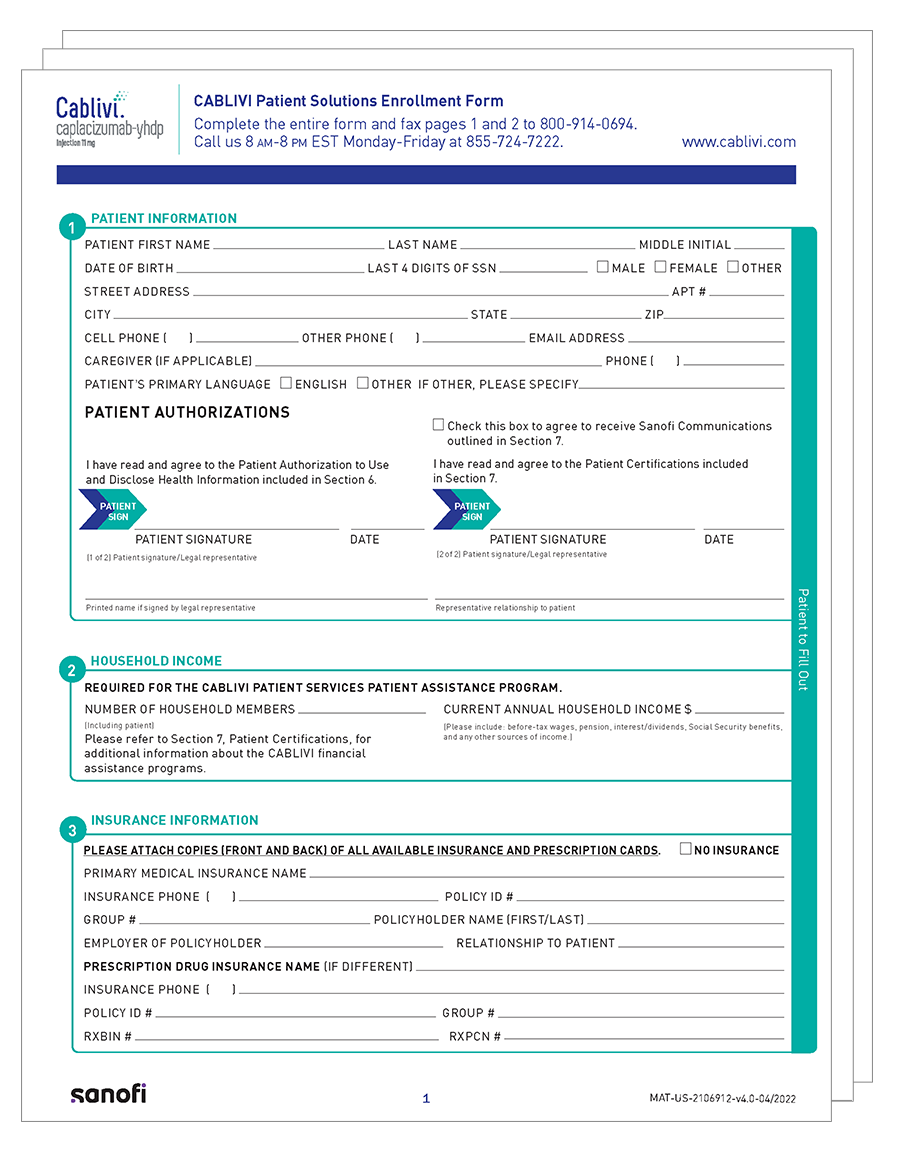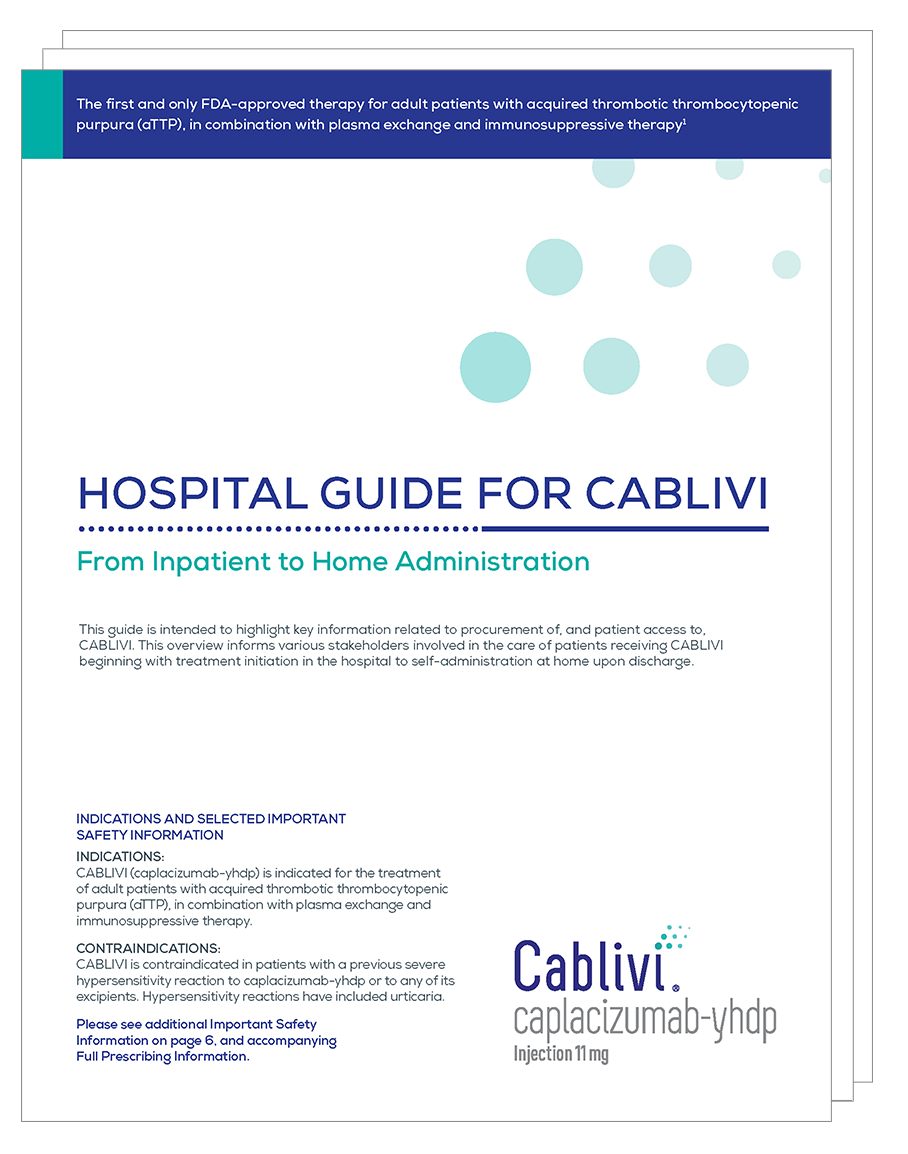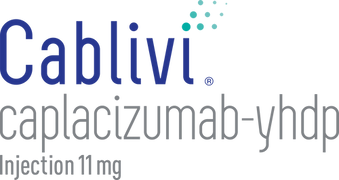CABLIVI pharmacy ordering information
Consider stocking or consigning CABLIVI so that therapy is on hand when it’s needed most. CABLIVI is available through a network of authorized specialty distributors (SDs) for hospital acquisition. Hospitals and health systems can obtain CABLIVI by placing an order to stock or consign through 1 of the 4 authorized SDs below. It is up to your institution to determine the procurement option that works best for your practice or facility. Sanofi does not recommend the use of any particular SD.
SDs for hospital inpatient acquisition
Cardinal SPD
1-855-855-0708
ASD
1-800-746-6273
McKesson SD
1-877-625-2566
BioCare SD
1-800-304-3064
If your institution enrolls in CoverMyMeds®, you can use it to complete and process electronic prior authorizations (ePAs) and enroll patients in CABLIVI Patient Solutions.
CABLIVI patient enrollment form
To help your patients transition from hospital to home, complete the CABLIVI Patient Enrollment Form as soon as treatment is initiated. Enroll by filling out the form online or download, print, and fax the enrollment form to 800-914-0694 to ensure your patients have access to support from both CABLIVI Patient Solutions and Biologics.
CABLIVI Patient Solutions:
- Provides financial assistance for eligible patients
- Helps patients with supplemental administration training
Biologics, the specialty pharmacy provider for CABLIVI:
- Performs a benefit investigation and faxes a summary of benefits to the HCP
- Coordinates timely home delivery of CABLIVI
- Provides ongoing support from nurses who can answer questions about CABLIVI
- Provides access to a pharmacist 24 hours a day, 7 days a week
Contact information for discharge planning
and shipping
Biologics
1-855-724-7222, Option 2
.png)
CABLIVI Patient Enrollment Form
Enroll patients in CABLIVI Patient Solutions for access to specialty pharmacy services, financial assistance, and supplemental injection training.

CABLIVI Hospital Guide
This guide highlights key information related to the
procurement of, and patient access to, CABLIVI.

Help patients access CABLIVI using coverage and reimbursement information

Confidence with Sanofi Promise—a CABLIVI warranty program
HCP=healthcare professional.
IMPORTANT SAFETY INFORMATION AND INDICATIONS
IMPORTANT SAFETY INFORMATION AND INDICATIONS
IMPORTANT SAFETY INFORMATION AND INDICATIONS
CONTRAINDICATIONS:
CABLIVI is contraindicated in patients with a previous severe hypersensitivity reaction to caplacizumab-yhdp or to any of its excipients. Hypersensitivity reactions have included urticaria.
WARNINGS AND PRECAUTIONS:
Hemorrhage:
- CABLIVI increases the risk of bleeding. In clinical studies, severe bleeding adverse reactions of epistaxis, gingival bleeding, upper gastrointestinal hemorrhage, and metrorrhagia were each reported in 1% of subjects. Overall, bleeding events occurred in approximately 58% of patients on CABLIVI versus 43% of patients on placebo.
- In the postmarketing setting cases of life-threatening and fatal bleeding were reported in patients receiving CABLIVI.
- The risk of bleeding is increased in patients with underlying coagulopathies (e.g. hemophilia, other coagulation factor deficiencies). It is also increased with concomitant use of CABLIVI with drugs affecting hemostasis and coagulation.
- Avoid concomitant use of CABLIVI with antiplatelet agents or anticoagulants. If clinically significant bleeding occurs, interrupt use of CABLIVI. Von Willebrand factor concentrate may be administered to rapidly correct hemostasis. If CABLIVI is restarted, monitor closely for signs of bleeding.
- Withhold CABLIVI for 7 days prior to elective surgery, dental procedures or other invasive interventions. If emergency surgery is needed, the use of von Willebrand factor concentrate may be considered to correct hemostasis. After the risk of surgical bleeding has resolved, and CABLIVI is resumed, monitor closely for signs of bleeding.
ADVERSE REACTIONS:
The most common adverse reactions (>15% of patients) were epistaxis (29%), headache (21%) and gingival bleeding (16%).
CONCOMITANT USE OF ANTICOAGULANTS OR ANTIPLATELET AGENTS:
Concomitant use of CABLIVI with any anticoagulant or antiplatelet agent may increase the risk of bleeding. Avoid concomitant use when possible. Assess and monitor closely for bleeding with concomitant use.
PREGNANCY:
There are no available data on CABLIVI use in pregnant women to inform a drug associated risk of major birth defects and miscarriage.
-
Fetal/neonatal adverse reactions: CABLIVI may increase the risk of bleeding in the fetus and neonate. Monitor neonates for bleeding.
-
Maternal adverse reactions: All patients receiving CABLIVI, including pregnant women, are at risk for bleeding. Pregnant women receiving CABLIVI should be carefully monitored for evidence of excessive bleeding.
INDICATIONS:
CABLIVI (caplacizumab-yhdp) is indicated for the treatment of adult patients with acquired thrombotic thrombocytopenic purpura (aTTP), in combination with plasma exchange and immunosuppressive therapy.
Please see full Prescribing Information.
Instructions For Use
Sharps Medical Waste Disposal (PDF)
Learn more about Sanofi’s commitment to fighting counterfeit drugs.
IMPORTANT SAFETY INFORMATION AND INDICATIONS
CONTRAINDICATIONS:
CABLIVI is contraindicated in patients with a previous severe hypersensitivity reaction to caplacizumab-yhdp or to any of its excipients. Hypersensitivity reactions have included urticaria.
WARNINGS AND PRECAUTIONS:
Hemorrhage:
- CABLIVI increases the risk of bleeding. In clinical studies, severe bleeding adverse reactions of epistaxis, gingival bleeding, upper gastrointestinal hemorrhage, and metrorrhagia were each reported in 1% of subjects. Overall, bleeding events occurred in approximately 58% of patients on CABLIVI versus 43% of patients on placebo.
- In the postmarketing setting cases of life-threatening and fatal bleeding were reported in patients receiving CABLIVI.
- The risk of bleeding is increased in patients with underlying coagulopathies (e.g. hemophilia, other coagulation factor deficiencies). It is also increased with concomitant use of CABLIVI with drugs affecting hemostasis and coagulation.
- Avoid concomitant use of CABLIVI with antiplatelet agents or anticoagulants. If clinically significant bleeding occurs, interrupt use of CABLIVI. Von Willebrand factor concentrate may be administered to rapidly correct hemostasis. If CABLIVI is restarted, monitor closely for signs of bleeding.
- Withhold CABLIVI for 7 days prior to elective surgery, dental procedures or other invasive interventions. If emergency surgery is needed, the use of von Willebrand factor concentrate may be considered to correct hemostasis. After the risk of surgical bleeding has resolved, and CABLIVI is resumed, monitor closely for signs of bleeding.
ADVERSE REACTIONS:
The most common adverse reactions (>15% of patients) were epistaxis (29%), headache (21%) and gingival bleeding (16%).
CONCOMITANT USE OF ANTICOAGULANTS OR ANTIPLATELET AGENTS:
Concomitant use of CABLIVI with any anticoagulant or antiplatelet agent may increase the risk of bleeding. Avoid concomitant use when possible. Assess and monitor closely for bleeding with concomitant use.
PREGNANCY:
There are no available data on CABLIVI use in pregnant women to inform a drug associated risk of major birth defects and miscarriage.
-
Fetal/neonatal adverse reactions: CABLIVI may increase the risk of bleeding in the fetus and neonate. Monitor neonates for bleeding.
-
Maternal adverse reactions: All patients receiving CABLIVI, including pregnant women, are at risk for bleeding. Pregnant women receiving CABLIVI should be carefully monitored for evidence of excessive bleeding.
INDICATIONS:
CABLIVI (caplacizumab-yhdp) is indicated for the treatment of adult patients with acquired thrombotic thrombocytopenic purpura (aTTP), in combination with plasma exchange and immunosuppressive therapy.
Please see full Prescribing Information.
Instructions For Use
Sharps Medical Waste Disposal (PDF)
Learn more about Sanofi’s commitment to fighting counterfeit drugs.
IMPORTANT SAFETY INFORMATION AND INDICATIONS
IMPORTANT SAFETY INFORMATION AND INDICATIONS
CONTRAINDICATIONS:
CABLIVI is contraindicated in patients with a previous severe hypersensitivity reaction to caplacizumab-yhdp or to any of its excipients. Hypersensitivity reactions have included urticaria.
WARNINGS AND PRECAUTIONS:
Hemorrhage:
- CABLIVI increases the risk of bleeding. In clinical studies, severe bleeding adverse reactions of epistaxis, gingival bleeding, upper gastrointestinal hemorrhage, and metrorrhagia were each reported in 1% of subjects. Overall, bleeding events occurred in approximately 58% of patients on CABLIVI versus 43% of patients on placebo.
- In the postmarketing setting cases of life-threatening and fatal bleeding were reported in patients receiving CABLIVI.
- The risk of bleeding is increased in patients with underlying coagulopathies (e.g. hemophilia, other coagulation factor deficiencies). It is also increased with concomitant use of CABLIVI with drugs affecting hemostasis and coagulation.
- Avoid concomitant use of CABLIVI with antiplatelet agents or anticoagulants. If clinically significant bleeding occurs, interrupt use of CABLIVI. Von Willebrand factor concentrate may be administered to rapidly correct hemostasis. If CABLIVI is restarted, monitor closely for signs of bleeding.
- Withhold CABLIVI for 7 days prior to elective surgery, dental procedures or other invasive interventions. If emergency surgery is needed, the use of von Willebrand factor concentrate may be considered to correct hemostasis. After the risk of surgical bleeding has resolved, and CABLIVI is resumed, monitor closely for signs of bleeding.
ADVERSE REACTIONS:
The most common adverse reactions (>15% of patients) were epistaxis (29%), headache (21%) and gingival bleeding (16%).
CONCOMITANT USE OF ANTICOAGULANTS OR ANTIPLATELET AGENTS:
Concomitant use of CABLIVI with any anticoagulant or antiplatelet agent may increase the risk of bleeding. Avoid concomitant use when possible. Assess and monitor closely for bleeding with concomitant use.
PREGNANCY:
There are no available data on CABLIVI use in pregnant women to inform a drug associated risk of major birth defects and miscarriage.
-
Fetal/neonatal adverse reactions: CABLIVI may increase the risk of bleeding in the fetus and neonate. Monitor neonates for bleeding.
-
Maternal adverse reactions: All patients receiving CABLIVI, including pregnant women, are at risk for bleeding. Pregnant women receiving CABLIVI should be carefully monitored for evidence of excessive bleeding.
INDICATIONS:
CABLIVI (caplacizumab-yhdp) is indicated for the treatment of adult patients with acquired thrombotic thrombocytopenic purpura (aTTP), in combination with plasma exchange and immunosuppressive therapy.
Please see full Prescribing Information.
Instructions For Use
Sharps Medical Waste Disposal (PDF)
Learn more about Sanofi’s commitment to fighting counterfeit drugs.
IMPORTANT SAFETY INFORMATION AND INDICATIONS
CONTRAINDICATIONS:
CABLIVI is contraindicated in patients with a previous severe hypersensitivity reaction to caplacizumab-yhdp or to any of its excipients. Hypersensitivity reactions have included urticaria.
WARNINGS AND PRECAUTIONS:
Hemorrhage:
- CABLIVI increases the risk of bleeding. In clinical studies, severe bleeding adverse reactions of epistaxis, gingival bleeding, upper gastrointestinal hemorrhage, and metrorrhagia were each reported in 1% of subjects. Overall, bleeding events occurred in approximately 58% of patients on CABLIVI versus 43% of patients on placebo.
- In the postmarketing setting cases of life-threatening and fatal bleeding were reported in patients receiving CABLIVI.
- The risk of bleeding is increased in patients with underlying coagulopathies (e.g. hemophilia, other coagulation factor deficiencies). It is also increased with concomitant use of CABLIVI with drugs affecting hemostasis and coagulation.
- Avoid concomitant use of CABLIVI with antiplatelet agents or anticoagulants. If clinically significant bleeding occurs, interrupt use of CABLIVI. Von Willebrand factor concentrate may be administered to rapidly correct hemostasis. If CABLIVI is restarted, monitor closely for signs of bleeding.
- Withhold CABLIVI for 7 days prior to elective surgery, dental procedures or other invasive interventions. If emergency surgery is needed, the use of von Willebrand factor concentrate may be considered to correct hemostasis. After the risk of surgical bleeding has resolved, and CABLIVI is resumed, monitor closely for signs of bleeding.
ADVERSE REACTIONS:
The most common adverse reactions (>15% of patients) were epistaxis (29%), headache (21%) and gingival bleeding (16%).
CONCOMITANT USE OF ANTICOAGULANTS OR ANTIPLATELET AGENTS:
Concomitant use of CABLIVI with any anticoagulant or antiplatelet agent may increase the risk of bleeding. Avoid concomitant use when possible. Assess and monitor closely for bleeding with concomitant use.
PREGNANCY:
There are no available data on CABLIVI use in pregnant women to inform a drug associated risk of major birth defects and miscarriage.
-
Fetal/neonatal adverse reactions: CABLIVI may increase the risk of bleeding in the fetus and neonate. Monitor neonates for bleeding.
-
Maternal adverse reactions: All patients receiving CABLIVI, including pregnant women, are at risk for bleeding. Pregnant women receiving CABLIVI should be carefully monitored for evidence of excessive bleeding.
INDICATIONS:
CABLIVI (caplacizumab-yhdp) is indicated for the treatment of adult patients with acquired thrombotic thrombocytopenic purpura (aTTP), in combination with plasma exchange and immunosuppressive therapy.
Please see full Prescribing Information.
Instructions For Use
Sharps Medical Waste Disposal (PDF)
Learn more about Sanofi’s commitment to fighting counterfeit drugs.
IMPORTANT SAFETY INFORMATION AND INDICATIONS
IMPORTANT SAFETY INFORMATION AND INDICATIONS
CONTRAINDICATIONS:
CABLIVI is contraindicated in patients with a previous severe hypersensitivity reaction to caplacizumab-yhdp or to any of its excipients. Hypersensitivity reactions have included urticaria.
WARNINGS AND PRECAUTIONS:
Hemorrhage:
- CABLIVI increases the risk of bleeding. In clinical studies, severe bleeding adverse reactions of epistaxis, gingival bleeding, upper gastrointestinal hemorrhage, and metrorrhagia were each reported in 1% of subjects. Overall, bleeding events occurred in approximately 58% of patients on CABLIVI versus 43% of patients on placebo.
- In the postmarketing setting cases of life-threatening and fatal bleeding were reported in patients receiving CABLIVI.
- The risk of bleeding is increased in patients with underlying coagulopathies (e.g. hemophilia, other coagulation factor deficiencies). It is also increased with concomitant use of CABLIVI with drugs affecting hemostasis and coagulation.
- Avoid concomitant use of CABLIVI with antiplatelet agents or anticoagulants. If clinically significant bleeding occurs, interrupt use of CABLIVI. Von Willebrand factor concentrate may be administered to rapidly correct hemostasis. If CABLIVI is restarted, monitor closely for signs of bleeding.
- Withhold CABLIVI for 7 days prior to elective surgery, dental procedures or other invasive interventions. If emergency surgery is needed, the use of von Willebrand factor concentrate may be considered to correct hemostasis. After the risk of surgical bleeding has resolved, and CABLIVI is resumed, monitor closely for signs of bleeding.
ADVERSE REACTIONS:
The most common adverse reactions (>15% of patients) were epistaxis (29%), headache (21%) and gingival bleeding (16%).
CONCOMITANT USE OF ANTICOAGULANTS OR ANTIPLATELET AGENTS:
Concomitant use of CABLIVI with any anticoagulant or antiplatelet agent may increase the risk of bleeding. Avoid concomitant use when possible. Assess and monitor closely for bleeding with concomitant use.
PREGNANCY:
There are no available data on CABLIVI use in pregnant women to inform a drug associated risk of major birth defects and miscarriage.
-
Fetal/neonatal adverse reactions: CABLIVI may increase the risk of bleeding in the fetus and neonate. Monitor neonates for bleeding.
-
Maternal adverse reactions: All patients receiving CABLIVI, including pregnant women, are at risk for bleeding. Pregnant women receiving CABLIVI should be carefully monitored for evidence of excessive bleeding.
INDICATIONS:
CABLIVI (caplacizumab-yhdp) is indicated for the treatment of adult patients with acquired thrombotic thrombocytopenic purpura (aTTP), in combination with plasma exchange and immunosuppressive therapy.
Please see full Prescribing Information.
Instructions For Use
Sharps Medical Waste Disposal (PDF)
Learn more about Sanofi’s commitment to fighting counterfeit drugs.
IMPORTANT SAFETY INFORMATION AND INDICATIONS
CONTRAINDICATIONS:
CABLIVI is contraindicated in patients with a previous severe hypersensitivity reaction to caplacizumab-yhdp or to any of its excipients. Hypersensitivity reactions have included urticaria.
WARNINGS AND PRECAUTIONS:
Hemorrhage:
- CABLIVI increases the risk of bleeding. In clinical studies, severe bleeding adverse reactions of epistaxis, gingival bleeding, upper gastrointestinal hemorrhage, and metrorrhagia were each reported in 1% of subjects. Overall, bleeding events occurred in approximately 58% of patients on CABLIVI versus 43% of patients on placebo.
- In the postmarketing setting cases of life-threatening and fatal bleeding were reported in patients receiving CABLIVI.
- The risk of bleeding is increased in patients with underlying coagulopathies (e.g. hemophilia, other coagulation factor deficiencies). It is also increased with concomitant use of CABLIVI with drugs affecting hemostasis and coagulation.
- Avoid concomitant use of CABLIVI with antiplatelet agents or anticoagulants. If clinically significant bleeding occurs, interrupt use of CABLIVI. Von Willebrand factor concentrate may be administered to rapidly correct hemostasis. If CABLIVI is restarted, monitor closely for signs of bleeding.
- Withhold CABLIVI for 7 days prior to elective surgery, dental procedures or other invasive interventions. If emergency surgery is needed, the use of von Willebrand factor concentrate may be considered to correct hemostasis. After the risk of surgical bleeding has resolved, and CABLIVI is resumed, monitor closely for signs of bleeding.
ADVERSE REACTIONS:
The most common adverse reactions (>15% of patients) were epistaxis (29%), headache (21%) and gingival bleeding (16%).
CONCOMITANT USE OF ANTICOAGULANTS OR ANTIPLATELET AGENTS:
Concomitant use of CABLIVI with any anticoagulant or antiplatelet agent may increase the risk of bleeding. Avoid concomitant use when possible. Assess and monitor closely for bleeding with concomitant use.
PREGNANCY:
There are no available data on CABLIVI use in pregnant women to inform a drug associated risk of major birth defects and miscarriage.
-
Fetal/neonatal adverse reactions: CABLIVI may increase the risk of bleeding in the fetus and neonate. Monitor neonates for bleeding.
-
Maternal adverse reactions: All patients receiving CABLIVI, including pregnant women, are at risk for bleeding. Pregnant women receiving CABLIVI should be carefully monitored for evidence of excessive bleeding.
INDICATIONS:
CABLIVI (caplacizumab-yhdp) is indicated for the treatment of adult patients with acquired thrombotic thrombocytopenic purpura (aTTP), in combination with plasma exchange and immunosuppressive therapy.
Please see full Prescribing Information.
Instructions For Use
Sharps Medical Waste Disposal (PDF)
Learn more about Sanofi’s commitment to fighting counterfeit drugs.
